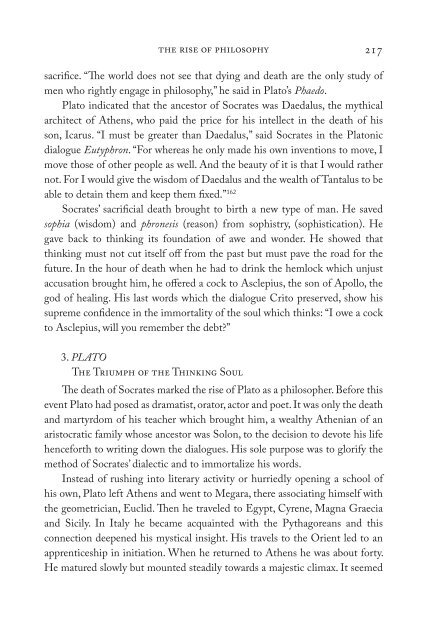The Gospel of Hellas - Research Institute for Waldorf Education
The Gospel of Hellas - Research Institute for Waldorf Education
The Gospel of Hellas - Research Institute for Waldorf Education
You also want an ePaper? Increase the reach of your titles
YUMPU automatically turns print PDFs into web optimized ePapers that Google loves.
the rise <strong>of</strong> philosophy<br />
sacrifice. “<strong>The</strong> world does not see that dying and death are the only study <strong>of</strong><br />
men who rightly engage in philosophy,” he said in Plato’s Phaedo.<br />
Plato indicated that the ancestor <strong>of</strong> Socrates was Daedalus, the mythical<br />
architect <strong>of</strong> Athens, who paid the price <strong>for</strong> his intellect in the death <strong>of</strong> his<br />
son, Icarus. “I must be greater than Daedalus,” said Socrates in the Platonic<br />
dialogue Eutyphron. “For whereas he only made his own inventions to move, I<br />
move those <strong>of</strong> other people as well. And the beauty <strong>of</strong> it is that I would rather<br />
not. For I would give the wisdom <strong>of</strong> Daedalus and the wealth <strong>of</strong> Tantalus to be<br />
able to detain them and keep them fixed.” 162<br />
Socrates’ sacrificial death brought to birth a new type <strong>of</strong> man. He saved<br />
sophia (wisdom) and phronesis (reason) from sophistry, (sophistication). He<br />
gave back to thinking its foundation <strong>of</strong> awe and wonder. He showed that<br />
thinking must not cut itself <strong>of</strong>f from the past but must pave the road <strong>for</strong> the<br />
future. In the hour <strong>of</strong> death when he had to drink the hemlock which unjust<br />
accusation brought him, he <strong>of</strong>fered a cock to Asclepius, the son <strong>of</strong> Apollo, the<br />
god <strong>of</strong> healing. His last words which the dialogue Crito preserved, show his<br />
supreme confidence in the immortality <strong>of</strong> the soul which thinks: “I owe a cock<br />
to Asclepius, will you remember the debt?”<br />
3. PLATO<br />
<strong>The</strong> Triumph <strong>of</strong> the Thinking Soul<br />
<strong>The</strong> death <strong>of</strong> Socrates marked the rise <strong>of</strong> Plato as a philosopher. Be<strong>for</strong>e this<br />
event Plato had posed as dramatist, orator, actor and poet. It was only the death<br />
and martyrdom <strong>of</strong> his teacher which brought him, a wealthy Athenian <strong>of</strong> an<br />
aristocratic family whose ancestor was Solon, to the decision to devote his life<br />
hence<strong>for</strong>th to writing down the dialogues. His sole purpose was to glorify the<br />
method <strong>of</strong> Socrates’ dialectic and to immortalize his words.<br />
Instead <strong>of</strong> rushing into literary activity or hurriedly opening a school <strong>of</strong><br />
his own, Plato left Athens and went to Megara, there associating himself with<br />
the geometrician, Euclid. <strong>The</strong>n he traveled to Egypt, Cyrene, Magna Graecia<br />
and Sicily. In Italy he became acquainted with the Pythagoreans and this<br />
connection deepened his mystical insight. His travels to the Orient led to an<br />
apprenticeship in initiation. When he returned to Athens he was about <strong>for</strong>ty.<br />
He matured slowly but mounted steadily towards a majestic climax. It seemed

















